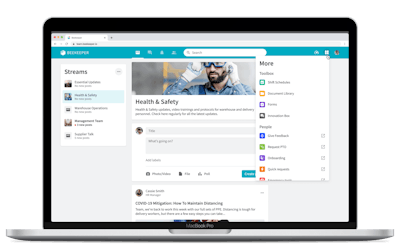
In the wake of the Coronavirus disease (COVID-19) pandemic, workforces across the supply chain have remained in a continuous state of change. Adapting to food shortages and multiple iterations of government-mandated transport regulations, the food logistics ecosystem has faced unprecedented challenges in an already complex global supply chain.
Logistics management has faced major setbacks such as disrupted supply chains, difficulty sourcing raw materials, higher border security and lack of available transport. These setbacks have made effective logistics communications across frontline workforces more imperative than ever, which has traditionally been a challenge among organizations due to employees working in remote locations and not tied to a desk and computer.
Most companies simply aren’t utilizing mobile communications tools for workplace collaboration, and it comes at a direct cost to efficiency. According to a Harvard Business Review survey, nearly 86% of companies say frontline workers need better technology to support accurate, independent judgment calls. Rather than stalling decision making, equipping employees with the right mobile communications tools can help them resolve issues independently and stay in adherence with safety and procedural guidelines.
To alleviate this pain point, workers across the supply chain can use mobile communication tools to allow for more agility and flexibility in their logistics communications. By tackling the following issues head-on, food logistics companies can resolve any communication breakdowns in the supply chain.
Create real-time, transparent communication channels.
Communication delays can create critical issues throughout the entire supply chain, reducing worker productivity and hurting a company’s bottom line. When communication speed is of utmost importance, there is no room for withholding information or keeping it out of frontline employees’ view. Additionally, a truly global business needs to have a single point of access for all supply chain information, so that workers can execute with efficiency.
To meet demand, timely communication between suppliers, customers and the workers who make the entire system move is not optional — it’s a must. Lags in communication can cause a cascade of problems across a logistics company’s supply chain, lowering output and increasing costs. Instant messaging for business and mobile solutions can help keep operations in sync. Such enterprise messaging enables real-time communication, giving employees and management the time to react to the ever-changing conditions in the logistics industry.
Enable collaboration with network-based communication.
Today’s logistics companies are no longer focused on singular geographic markets. Instead, they are global organizations that work in interdependent, networked economies that require more collaboration and cooperation. This new paradigm requires an understanding of different markets, and all aspects of the supply chain must be securely connected and communicated.
To facilitate the necessary team collaboration, it’s important to use the right tools for internal communications. Mobile solutions let workers communicate in real-time, connecting everyone from frontline employees to corporate offices.
Ensure secure data transmission
Logistics communication often deals with sensitive information. Moving data over a well-trafficked network can be high-risk, especially with international communications that cross borders. Simply relying on traditional communications methods, like email servers or consumer messaging apps can place sensitive data and procedural information at risk.
Selecting a secure communication technology service is imperative for protecting the company’s digital infrastructure. Organizations should pay close attention to data security and perform regular security audits to ensure secure data transmission.
Automate routine procedures to reduce complexity
From fleet management to supply ordering to sourcing and procurement, a single communication problem can cause a ripple effect and completely disrupt shipments or overall workflow.
Logistics communication involves complex coordination among different departments and workers within an organization, including both inbound and outbound shipping and receiving. With so many moving parts, a mobile solution allows teams to automate critical business processes and communications to simplify logistics management, keep workflows moving and stay on schedule.
Communication is key when optimizing logistics networks
When addressing communication challenges in the logistics industry, it’s important to avoid quick and easy fixes and instead prepare for the future by taking an integrated, omnichannel approach to optimization.
In order to do this, organizations must first understand their business goals and objectives and how they will evaluate results, as well as how new technologies or better communication processes will enhance their ability to achieve those goals.
With razor-thin margins in a fast-paced industry, logistics companies must adapt to this new, globalized order. This means focusing on team collaboration instead of competition and on open network instead of closed markets. Good communication flows are critical to operating a successful logistics company.




















